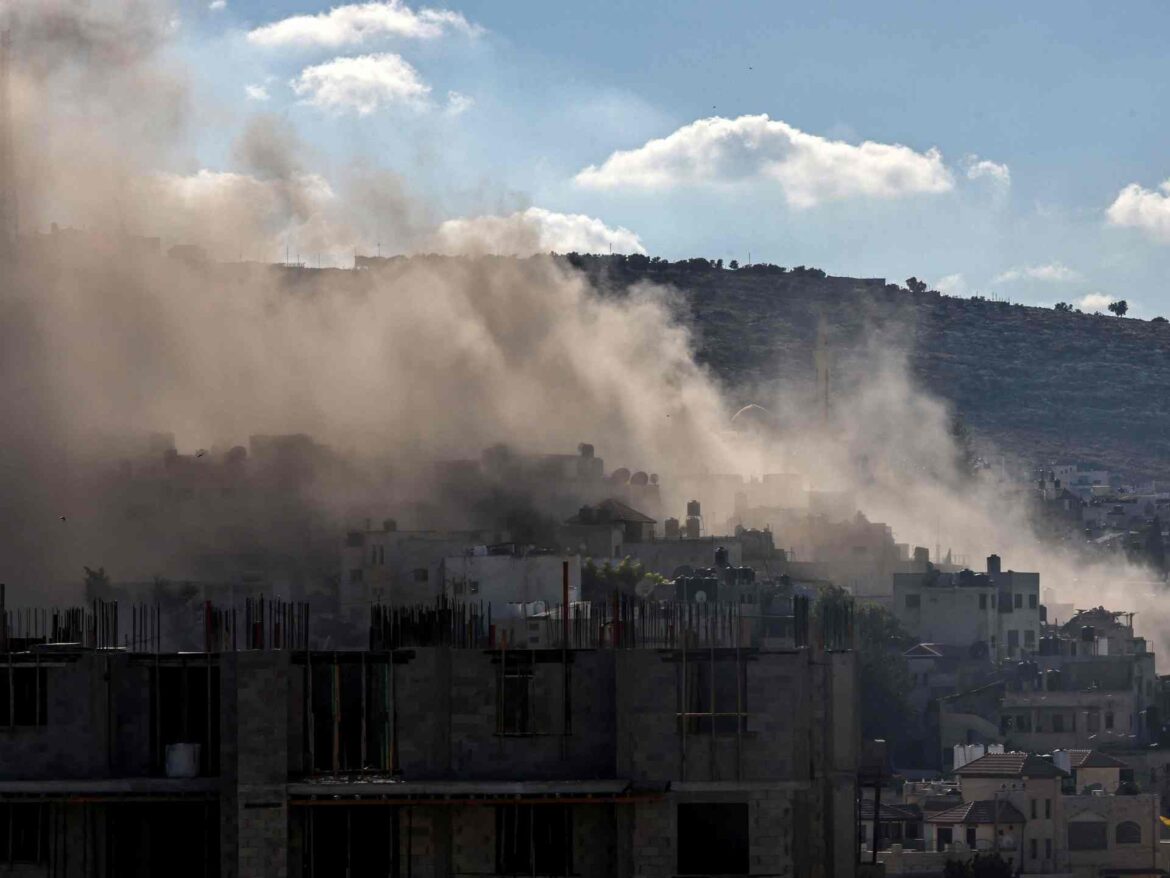Palestinian Adnan Naghnaghiya has been sheltering in his home for eight days, as Israeli forces carry out raids, arrests and battles with militants in the occupied West Bank.
Naghnagiya, 56, a father of five, lives in the Jenin refugee camp in the northern occupied West Bank, an area that has been targeted by a series of intense Israeli attacks since August 28 under the pretext of “fighting terrorism.”
Naghnagiya likens the conditions he lives in to “prison,” and asserts that the presence of Israeli soldiers in their longest operation in decades against Palestinian elements in the West Bank has paralyzed life in Jenin.
“They force you to stay inside the house instead of going out and living a normal life,” he continued. Leaving the house has become a dangerous task, so much so that Naghnagiya was talking to an AFP correspondent on the phone, even though they are both in the Jenin camp, 600 meters apart.
In the camp’s narrow alleys, Israeli armored vehicles and bulldozers left a trail of destruction as fighting continued, and Naghnagiya said most residents had “already left”, seeking safe haven elsewhere.
After years of repeated raids on Jenin camp, its residents have gained “experience” in waiting them out, said Naghnagiya, who has stockpiled enough food for several days but now fears it could run out. “We plan for two or three days, not a week or two,” he said.
Last Monday, Israeli occupation forces searched the family home, which houses about 20 people, including children from Naghnagiya’s relatives. He said that before they left, one of the soldiers fired shots into the roof of the house, noting that he had no idea why they were searching.
In Jenin, Fadwa Dababneh, 68, relies on an ambulance to deliver her groceries. Other vehicles have largely disappeared from the streets amid the gunfire, and many roads have been swept away. As for drinking water, she says, “when the Red Crescent car passed by, we took it from them.”
In addition to treating the injured, medical teams now have to deliver food and other essentials or help residents move around the city in emergency situations.
A woman who asked not to be named said she had to get into an ambulance for routine medical checks at a hospital. “There is a lot of destruction, a lot of devastation. People are tired,” she said.
changing
Israeli military attacks have forced health workers to make rapid changes to their way of working. Some who are unable to return home are working 24 hours a day.
“If we want to leave the hospital, we need a permit or coordination with an ambulance, because the area we are in is dangerous and most of the confrontations and closures are at the hospital door,” said Dr. Mu’ayyad Khalifa, 29, from Al-Amal Hospital near Jenin, a maternity hospital that has been receiving people injured by Israeli attacks.
Hospital director Mohammed al-Arda was unable to reach the facility for a week due to the fighting and had to manage operations by phone, while some staff were unable to come to work, AFP reported.
He pointed out that the situation has deteriorated further due to water cuts “6 or 7 times” since last week and frequent power outages.
The ongoing Israeli attacks in the northern West Bank have led to the martyrdom of 36 Palestinians since last week, according to the Palestinian Ministry of Health, which announced today, Thursday, the fall of 5 martyrs in a strike on a car in the Tubas area, south of Jenin. Armed factions announced the martyrdom of a number of their men, and the Israeli occupation forces arrested dozens of Palestinians.
Since the Gaza war began on October 7, at least 661 Palestinians have been killed in attacks by the Israeli army and settlers in the West Bank, according to the Palestinian Ministry of Health, while at least 23 Israelis, including military personnel, have been killed in attacks by Palestinians in the area during the same period, according to Israeli officials.



